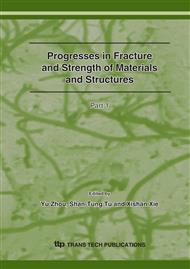p.1090
p.1094
p.1098
p.1102
p.1106
p.1110
p.1117
p.1121
p.1125
The Evaluation of the Effects of the Maximum Stress Intensity Factor for Fatigue Crack Opening Behavior by Finite Element Analysis
Abstract:
The cyclic crack tip opening displacement is well related to fatigue crack opening behavior. In this paper, we investigate the effect of the maximum stress intensity factor, Kmax, when predicting fatigue crack opening behavior using the cyclic crack tip opening displacement obtained from FEA. The commercial finite element code, ANSYS, for fatigue crack closure analysis in this study is used. We derive the prediction formula of crack opening behavior when using the cyclic crack tip displacement obtained from the FEA. The numerical prediction shows the good results regardless of stress ratios. It is confirmed that the crack opening behavior depends upon the maximum stress intensity factor Kmax.
Info:
Periodical:
Pages:
1106-1109
Citation:
Online since:
September 2007
Authors:
Price:
Сopyright:
© 2007 Trans Tech Publications Ltd. All Rights Reserved
Share:
Citation:


